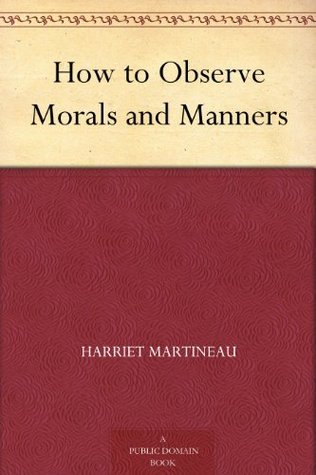Kindle Notes & Highlights
Such are the general tendencies, modified according to circumstances.
Having noted the aspect of the country, the observer's next business is to ascertain the condition of the inhabitants as to the supply of the Necessaries of life.
He knows that nothing remains to be learned of the domestic morals of people who are plunged in hopeless poverty. There is no foundation for good morals among such. They herd together, desperate or depressed; they have no prospect; their self-respect is prostrated; they have nothing to lose, there is nothing for them to gain by any effort that they can make.—But it is needless to speak of this. When we treat of the domestic morals of any class, it is always presupposed that they are not in circumstances which render total immorality almost inevitable.
The Health of a community is an almost unfailing index of its morals. No one can wonder at this who considers how physical suffering irritates the temper, depresses energy, deadens hope, induces recklessness, and, in short, poisons life.
neither the composition of the government, nor the body of the laws, nor the administration of them, is an evidence of what the idea of liberty at present is among the people, except in a democratic republic, where the acts of the government are the result of the last expression of the national will.
"Plus un peuple nombreux se rapproche," says Rousseau, "moins le gouvernement peut usurper sur le souverain. L'avantage d'un gouvernement tyrannique est donc en ceci, d'agir à grandes distances. A l'aide des points d'appui qu'il se donne, sa force augmente au loin, comme celle des léviers. Celle du peuple, au contraire, n'agit que concentrée: elle s'évapore et se perd en s'étendant, comme l'effet de la poudre éparse à terre, et qui ne prend feu que grain à grain. Les pays les moins peuplés sont ainsi les plus propres à la tyrannie. Les bêtes féroces ne règnent que dans les déserts."
Newspapers are a strong evidence of the political ideas of a people;—not individual newspapers; for no two, perhaps, fully agree in principles and sentiment, and it is to be feared that none are positively honest. Not by individual newspapers must the traveller form his judgment, but by the freedom of discussion which he may find to be permitted, or the restraints upon discussion imposed.
In countries where there is any Free Education, the traveller must observe its nature; and especially whether the subjects of it are distinguished by any sort of badge. The practice of badging, otherwise than by mutual consent, is usually bad: it is always suspicious. The traveller will note whether free education is conferred by charitable bequest, (a practice originating in times when the doctrine of expiation was prevalent, and continued to this day by its union with charity,) or whether it is framed at the will of the sovereign, that his young subjects may be trained to his own
...more
Persecution for opinion is always going on among a people enlightened enough to entertain any opinions at all.
The testimony of no two would be found to agree; and, if the traveller depended upon them for his general facts, he could never furnish a record which could be trusted.
At its touch the abundance of the heart will gush out at the lips. Men are so made that they cannot but speak of what interests them most to those who most share the interest.
To keep himself up to his business, and stimulate his flagging attention, he should provide himself, before setting out, with a set of queries, so prepared as to include every great class of facts connected with the condition of a people, and so divided and arranged as that he can turn to the right set at the fitting moment.—These queries are not designed to be thrust into the hand of any one who may have information to give.
When he has done his best in the preparation of his lists, he must still keep on the watch to enlarge them, as occasion arises.
The delay of a single day is found to reduce the matter unaccountably.


